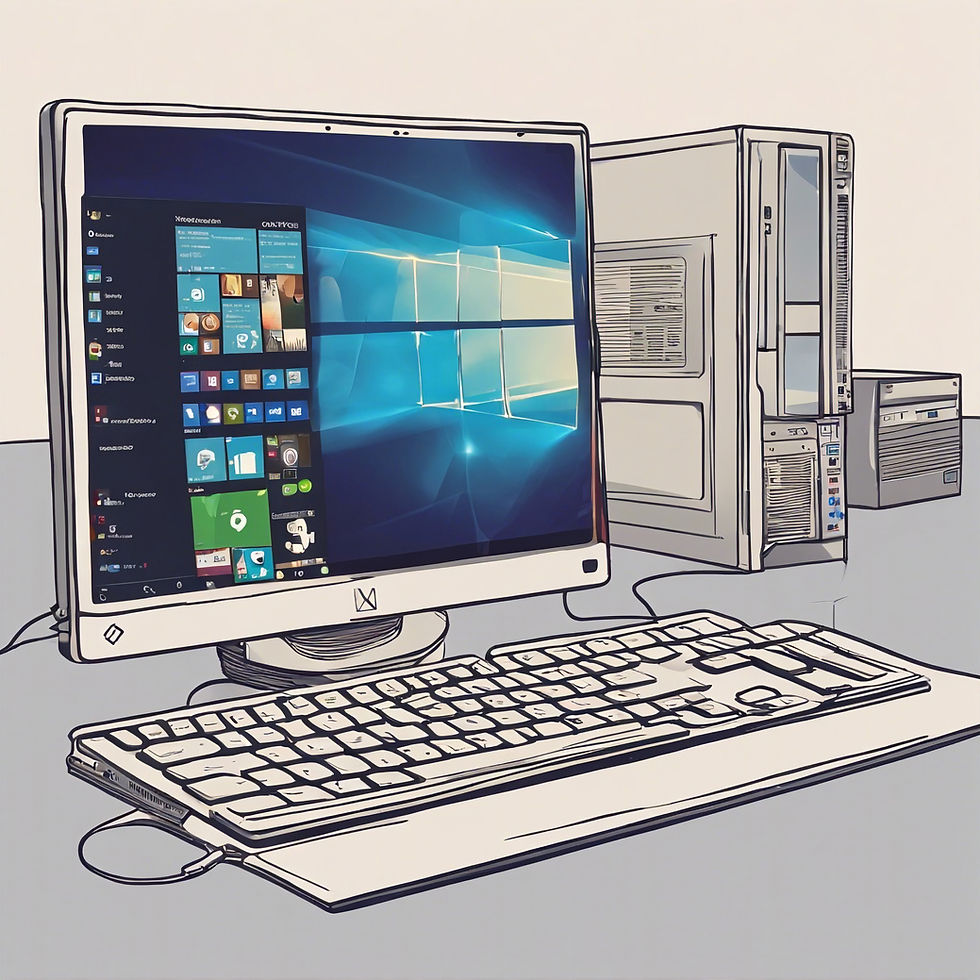Best Practices for Computer Use: A Guide for Solo Mental Health Telehealth Practitioners
- David Larsen
- May 28, 2024
- 6 min read

Vol. 1, No. 5 | May 28, 2024 | By Dave Larsen, Väsentlig Consulting LLC
In the rapidly evolving field of mental health care, many practitioners are transitioning to home-based or remote work environments. Telehealth has become the primary method of client interaction, bringing both convenience and a new set of challenges. One of the most critical aspects of this transition is ensuring that your computer use is secure, efficient, and reliable.
This guide will provide practical tips and best practices for daily computer use, with a particular focus on browser habits and operating system updates. These recommendations will help protect your data, maintain client confidentiality, and improve overall workflow.
Why This is Essential
As a mental health practitioner, you handle sensitive and confidential information daily. Ensuring the security of this data is not only a legal and ethical obligation but also fundamental to maintaining your professional reputation.
Poor computer habits can lead to security breaches, data loss, and decreased productivity. This guide aims to help you understand the importance of good computer practices and how to implement them effectively.
Best Practices for Daily Computer Use
1. Regularly Update Your Operating System
Why it Matters: Your operating system (OS) is the backbone of your computer. It manages all hardware and software functions, making it essential to keep it up-to-date. Regular updates often include security patches that protect your computer from vulnerabilities that could be exploited by hackers, and ensure you remain compliant with HIPPA and HITECH guidance.
Analogy: Think of your OS as the foundation of a house. If the foundation is weak or cracked, the entire structure is at risk. Similarly, an outdated OS can compromise the security and functionality of your computer.
Best Practice: Enable automatic updates if possible, and check for updates at least once a week. This ensures you always have the latest security patches and improvements.
2. Use Strong and Unique Passwords
Why it Matters: Passwords are your first line of defense against unauthorized access. Weak or reused passwords can be easily guessed or cracked, putting your sensitive information at risk.
Analogy: Imagine your passwords as the locks on your doors. A weak password is like a flimsy lock that a burglar can easily pick. Strong, unique passwords are robust locks that provide better security.
Best Practice: Use a password manager to generate and store complex passwords. Ensure each password is at least 12 characters long and includes a mix of letters, numbers, and symbols.
3. Implement Two-Factor Authentication (2FA)
Why it Matters: Two-factor authentication adds an extra layer of security by requiring a second form of verification in addition to your password. This makes it significantly harder for unauthorized users to access your accounts.
Analogy: Think of 2FA as requiring both a key and a code to enter your house. Even if someone steals your key (password), they can't get in without the code (second factor).
Best Practice: Enable 2FA on all accounts that support it, especially email, banking, and any web-based applications used for telehealth.
4. Regularly Backup Your Data
Why it Matters: Regular backups protect your data from loss due to hardware failure, accidental deletion, or cyber-attacks like ransomware. Having recent backups ensures you can quickly recover your data and minimize downtime.
Analogy: Consider backups as insurance for your data. Just like you wouldn't drive without car insurance, you shouldn't operate without data backups.
Best Practice: Use automated backup solutions to regularly save your data to an external drive or cloud storage. Aim to backup daily or weekly, depending on the volume of data you handle.
Proper Browser Use
1. Log Off Web-Based Applications
Why it Matters: Staying logged in to web-based applications can expose your accounts to unauthorized access, especially if your computer is shared or left unattended. Logging off ensures that even if someone gains physical access to your computer, they can't easily access sensitive information.
Analogy: Leaving yourself logged in is like leaving the keys in the ignition of your car. It’s an open invitation for trouble.
Best Practice: Make it a habit to log off from all web-based applications at the end of each session. This simple step enhances security and protects your data.
2. Close All Tabs When Not in Use
Why it Matters: Having multiple tabs open can slow down your computer, cause distractions, and potentially expose you to security risks. Some websites may continue to run scripts in the background, consuming resources and posing privacy threats.
Analogy: Open tabs are like leaving various appliances on in your home. Not only does it waste energy, but it also increases the chances of something going wrong.
Best Practice: Close all tabs at the end of each browsing session. If you need to keep certain pages accessible, use the bookmark feature to save them for later.
3. Use a Secure and Up-to-Date Browser
Why it Matters: Browsers are your gateway to the internet, and using an outdated or insecure browser can expose you to various threats such as malware, phishing attacks, and data breaches.
Analogy: Think of your browser as the front door to your online world. A secure, updated browser is like having a reinforced front door with a strong lock.
Best Practice: Use reputable browsers like Google Chrome, Mozilla Firefox, or Microsoft Edge, and ensure they are set to update automatically. Regularly check for and install any updates to keep your browser secure.
4. Clear Cache and Cookies Regularly
Why it Matters: Cache and cookies can store sensitive information, such as login details and browsing history. Over time, this data can be exploited by cybercriminals or simply clutter your browser, slowing it down.
Analogy: Clearing your cache and cookies is like cleaning out your refrigerator. It gets rid of old, unnecessary items that could be harmful or just taking up space.
Best Practice: Clear your browser's cache and cookies at least once a month. This practice enhances privacy and improves browser performance.
5. Avoid Using Public Wi-Fi for Sensitive Tasks
Why it Matters: Public Wi-Fi networks are often unsecured, making it easy for hackers to intercept your data. Conducting sensitive tasks, such as telehealth sessions or accessing client information, on public Wi-Fi can compromise your data's security.
Analogy: Using public Wi-Fi for sensitive tasks is like discussing private matters in a crowded coffee shop. There's no guarantee who might be listening.
Best Practice: Use a Virtual Private Network (VPN) when accessing sensitive information on public Wi-Fi. A VPN encrypts your data, making it much harder for anyone to intercept it.
Taking Security Seriously
1. Install and Maintain Antivirus Software
Why it Matters: Antivirus software helps detect and remove malicious software (malware) that can compromise your computer's security. Regular scans can prevent and mitigate threats like viruses, spyware, and ransomware.
Analogy: Antivirus software is like having a security system in your home. It monitors for intrusions and alerts you to potential threats.
Best Practice: Install reputable antivirus software and set it to update automatically. Perform regular scans at least once a week to ensure your computer remains free from malware.
2. Be Cautious with Email Attachments and Links
Why it Matters: Phishing attacks often use email attachments and links to distribute malware or steal sensitive information. Being cautious with these can prevent accidental downloads of harmful software.
Analogy: Treat email attachments and links like suspicious packages. If you're not expecting them or they come from unknown sources, it's best to approach with caution.
Best Practice: Verify the sender's identity before opening attachments or clicking on links. If an email seems suspicious, do not engage with it and report it as phishing.
3. Regularly Review Privacy Settings
Why it Matters: Your privacy settings control how much information you share and with whom. Regularly reviewing and adjusting these settings helps protect your personal and professional data.
Analogy: Reviewing privacy settings is like checking the locks and alarms in your home. It ensures that your personal space remains secure.
Best Practice: Review privacy settings on all your accounts, especially social media and web-based applications. Adjust them to limit data sharing and enhance privacy.
4. Use Encrypted Communication Channels
Why it Matters: Encryption protects your communications from being intercepted and read by unauthorized parties. This is crucial for maintaining client confidentiality during telehealth sessions.
Analogy: Encrypted communication is like sending messages in a locked box that only the recipient can open. It ensures that your information remains private.
Best Practice: Use encrypted email services and communication tools for client interactions.
5. Educate Yourself Continuously
Why it Matters: Cyber threats are constantly evolving, and staying informed about the latest security practices helps you stay ahead of potential risks.
Analogy: Think of cybersecurity education as ongoing professional development. Just as you keep up with the latest trends in mental health, staying updated on security practices is essential for your professional toolkit.
Best Practice: Participate in webinars, read articles, and take courses on cybersecurity. Staying informed helps you adapt to new threats and implement the best practices.
Conclusion
Maintaining good computer habits and following best practices for browser use and operating system updates are crucial for solo mental health practitioners working remotely. By implementing these recommendations, you can protect sensitive client information, enhance your workflow, and safeguard your professional reputation.
Remember, your computer is an essential tool, and an extension of your practice. Taking care of it ensures that you can provide the best care to your clients.
References
National Institute of Standards and Technology. (2021). Cybersecurity Framework. Retrieved from https://www.nist.gov/cyberframework
American Psychological Association. (2020). Ethical Principles of Psychologists and Code of Conduct. Retrieved from https://www.apa.org/ethics/code
NortonLifeLock. (2022). Why are Software Updates so Important?. Retrieved from https://us.norton.com/internetsecurity-how-to-why-are-software-updates-so-important.html
National Cyber Security Centre. (2021). Password Guidance: Simplifying Your Approach. Retrieved from https://www.ncsc.gov.uk/collection/passwords
HealthIT.gov. (2021). Telehealth and Privacy. Retrieved from https://www.healthit.gov/topic/privacy-security-and-hipaa/telehealth-and-privacy




Comments